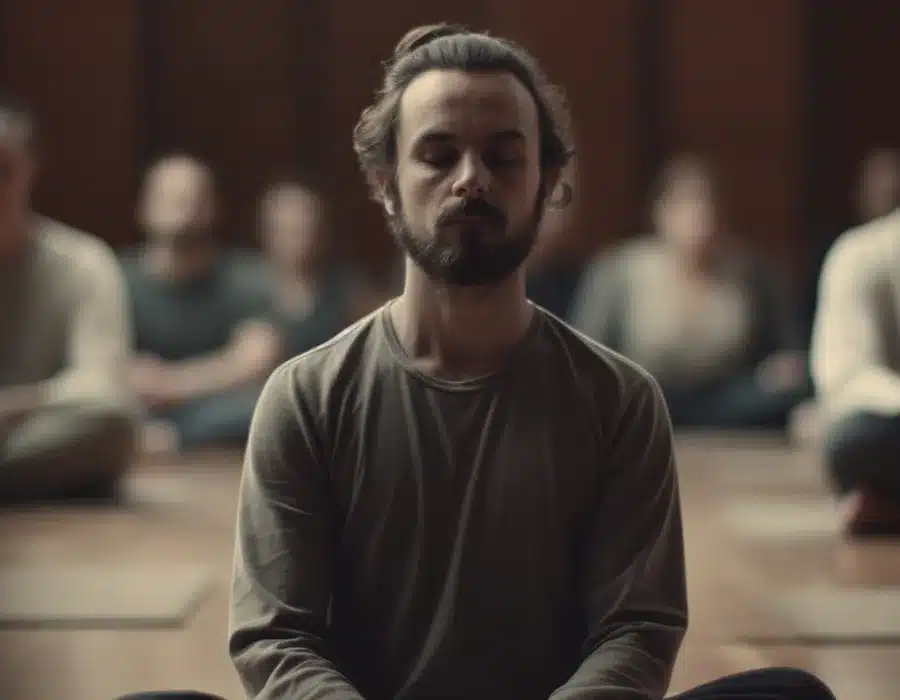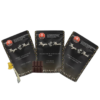A few years ago, I found myself in a relentless cycle of overthinking and stress. Life felt like a never-ending to-do list, with constant demands pulling me in different directions. I would lay awake at night replaying conversations, worrying about the future, and feeling the weight of everything I hadn’t accomplished that day. My mind was stuck in overdrive, and no amount of distraction could quiet it. I tried the usual methods—binge-watching shows, scrolling on my phone, and even indulging in a little retail therapy—but none of it gave me the sense of peace I was searching for. I was exhausted, mentally and emotionally, and knew something had to change.
That’s when I learned how to meditate. I’ll be honest, I was skeptical at first. The idea of sitting still and doing nothing seemed unproductive and, frankly, intimidating. My first few attempts were laughably difficult—my mind wandered constantly, I couldn’t stop fidgeting, and I felt frustrated more often than calm. But something about the practice intrigued me. I liked the idea of having a tool I could use to quiet my mind whenever I needed it. So, I kept going, carving out just five minutes a day to sit with my thoughts.
Over time, something shifted. Those five minutes turned into ten, then fifteen, and I started noticing subtle changes in my day-to-day life. I was less reactive when things didn’t go as planned. I could focus better at work and approach challenges with more clarity and patience. My sleep improved, too—I found that the simple act of meditating before bed helped me unwind and let go of the day’s worries. What began as an experiment turned into a daily habit, and eventually, meditation became the anchor I didn’t know I needed.
Looking back, I can’t imagine my life without meditation. It’s more than just a tool for relaxation; it’s a way to reconnect with myself, reset my perspective, and find balance no matter how chaotic life gets. If you’ve ever felt overwhelmed, stuck, or simply out of sync with yourself, meditation might just be the key to unlocking the peace and clarity you’ve been searching for.

What Science Says About Meditation
Meditation is no longer just a practice tied to ancient traditions or spiritual pursuits; it has firmly established itself as a scientifically-backed tool for mental and physical well-being. Over the past few decades, researchers have delved into the neurological and physiological effects of meditation, uncovering a treasure trove of benefits that span far beyond mere relaxation. At the heart of these findings lies meditation’s profound impact on the brain. Studies using functional MRI scans have revealed that regular meditation increases activity in the prefrontal cortex, the area responsible for executive functions like decision-making, emotional regulation, and focus. This enhanced brain activity translates to a calmer, more resilient state of mind.
One of the most significant discoveries is meditation’s ability to lower levels of cortisol, the hormone most closely associated with stress. Chronic stress floods the body with cortisol, contributing to issues like high blood pressure, anxiety, and even suppressed immune function. Meditation acts as a reset button, reducing cortisol levels and activating the parasympathetic nervous system, which promotes relaxation and healing. Over time, this can lead to a noticeable reduction in stress-related symptoms and an improved sense of overall well-being.
Research also highlights meditation’s role in neuroplasticity—the brain’s ability to adapt and rewire itself. Through consistent practice, meditation helps build new neural pathways, fostering a greater sense of awareness, compassion, and mental clarity. This is particularly important in today’s fast-paced world, where distractions and information overload are constant challenges. Furthermore, studies show that mindfulness meditation can enhance gamma wave activity in the brain, which is linked to heightened focus, creativity, and improved cognitive performance.
Meditation isn’t just about the mind—it also positively affects the body. Scientific evidence shows that regular meditation lowers blood pressure, reduces inflammation, and even slows the aging process by lengthening telomeres, the protective caps on our DNA. With such a wealth of scientific backing, it’s clear that meditation is a powerful tool for cultivating a healthier, more balanced life.
Core Benefits
The benefits of meditation extend into nearly every facet of life, offering a holistic approach to well-being. While the practice has countless advantages, five core benefits stand out for their transformative effects on both the mind and body.
Stress Reduction
Perhaps the most well-known benefit of meditation is its ability to reduce stress. When life feels overwhelming, meditation serves as a refuge, calming the nervous system and creating space for a reset. By engaging the parasympathetic nervous system, meditation helps to counteract the body’s “fight or flight” response, which is often triggered by stress. This leads to a tangible sense of relaxation and balance. Over time, regular practice can help you develop greater resilience to stress, enabling you to approach challenges with a sense of calm rather than panic.
Improved Focus and Clarity
In a world filled with endless distractions, staying focused can feel like an uphill battle. Meditation trains the mind to tune out noise and stay present in the moment. This heightened focus translates to greater productivity, better decision-making, and improved problem-solving skills. Studies have shown that even short bursts of mindfulness practice can enhance attention spans and improve working memory, making meditation a valuable tool for anyone looking to sharpen their cognitive abilities.
Emotional Regulation
One of the most transformative aspects of meditation is its ability to foster emotional regulation. By cultivating self-awareness, meditation helps you recognize and understand your emotions without becoming overwhelmed by them. This increased awareness creates a buffer between stimulus and response, allowing you to respond thoughtfully rather than react impulsively. Whether it’s managing anger, dealing with sadness, or reducing anxiety, meditation equips you with the tools to navigate your emotional landscape with grace and composure.

Better Sleep
Sleep issues are often rooted in an overactive mind, and meditation offers a natural solution. By quieting racing thoughts and promoting relaxation, meditation prepares your body for a restful night. Practices like body scans or guided meditations before bed can help you transition from the busyness of the day to a state of deep rest. Over time, regular meditation can improve both the quality and duration of sleep, leaving you feeling more refreshed and energized.
Mind-Body Connection
Meditation bridges the gap between the mind and body, fostering a sense of physical awareness that is often overlooked in our daily lives. Mindfulness practices encourage you to tune into your body’s sensations, whether it’s noticing tension, tracking your breath, or simply feeling grounded in the present moment. This heightened awareness not only enhances your physical well-being but also helps you make better lifestyle choices. Many people find that regular meditation inspires them to eat healthier, exercise more, and prioritize self-care.
Each of these core benefits builds on the others, creating a ripple effect of positive changes that can transform your life. With consistent practice, meditation becomes more than just a momentary escape—it’s a lifelong tool for cultivating peace, clarity, and balance.
Microdosing Psilocybin and Meditation
In recent years, there’s been growing interest in combining meditation with psilocybin microdosing. Psilocybin, the active compound in magic mushrooms, has been shown to enhance focus, reduce overthinking, and deepen introspective states. When paired with meditation, it can amplify the practice, making it easier to quiet the mind and access profound insights.
I remember trying this combination during a particularly challenging time in my life. With careful microdosing and guided meditations, I experienced a level of clarity and emotional release that was transformative. Studies suggest that psilocybin works synergistically with meditation to promote neuroplasticity, helping the brain form new and healthier patterns of thought.

Practical Tips for Starting Meditation
Starting a meditation practice may seem intimidating at first, especially if you’re new to the idea of sitting still and quieting your mind. However, the beauty of meditation lies in its simplicity and adaptability. You don’t need fancy equipment, hours of free time, or prior experience to get started. The following practical tips will help you ease into meditation and build a sustainable habit.
Start Small: Begin with 5–10 Minutes a Day
One of the most common mistakes beginners make is trying to do too much, too soon. Meditation doesn’t require you to commit to hours of practice right away. In fact, starting with just five to ten minutes a day can be incredibly effective. Short sessions allow you to establish a routine without feeling overwhelmed. Set a timer, find a quiet space, and dedicate this brief window of time to yourself. As you grow more comfortable, you can gradually increase the duration of your sessions.
Consistency is more important than duration when you’re beginning. Think of meditation as a mental muscle—you’re building strength over time. Even a few minutes of daily practice can yield noticeable benefits, such as improved focus and reduced stress.
Choose a Method That Resonates with You
Meditation isn’t a one-size-fits-all practice, and there are numerous methods to explore. If one approach doesn’t feel right, don’t hesitate to try another.
- Mindfulness Meditation: This involves focusing on your breath or a specific sensation while observing your thoughts without judgment. It’s a great starting point for beginners.
- Body Scans: This method guides your attention through different parts of your body, promoting relaxation and awareness. It’s particularly useful for stress relief and winding down before sleep.
- Guided Meditations: These involve listening to a recorded voice or app that provides instructions and imagery. Popular apps like Calm, Headspace, or Insight Timer offer a wide range of guided meditations tailored to different needs.
- Mantra Meditation: Repeating a word, phrase, or sound (like “om”) helps focus the mind and creates a rhythm for your practice.
- Movement-Based Meditation: Practices like yoga or tai chi incorporate mindfulness into physical movement, making them ideal if sitting still feels challenging.
Experiment with different techniques to find what resonates with you. The goal is to discover a practice that feels natural and enjoyable, increasing the likelihood that you’ll stick with it.
Create a Comfortable Space
Your environment plays a significant role in shaping your meditation experience. Choose a quiet, clutter-free spot where you feel relaxed and at ease. While you don’t need a dedicated meditation room, it helps to have a consistent place to practice. Add elements that enhance the atmosphere, such as cushions, a cozy blanket, candles, or soft lighting.
Ensure that your posture is comfortable but alert. Whether you’re sitting on a chair, a cushion, or the floor, keep your back straight and your shoulders relaxed. The goal is to strike a balance between comfort and attentiveness, allowing you to focus without distraction.

Build a Routine
Meditation becomes most effective when it’s part of your daily routine. Choose a time that works best for you, whether it’s first thing in the morning to set the tone for your day, during a lunch break to reset your focus, or in the evening to unwind before bed. Pair your meditation practice with an existing habit—like brushing your teeth or making coffee—to make it easier to remember.
Consistency is key, but don’t be discouraged if you miss a day. Life happens, and meditation should be a source of calm, not pressure. Simply return to your practice the next day and focus on building momentum.
Pair Meditation with Journaling
For a deeper reflective practice, consider pairing meditation with journaling. After a session, take a few minutes to jot down your thoughts, feelings, or insights. This can help you process emotions, track your progress, and identify patterns in your mental and emotional state. Journaling complements meditation by encouraging self-awareness and providing a space for introspection.
Manage Expectations and Be Patient
It’s natural to expect immediate results, but meditation is a skill that develops over time. At first, your mind may wander frequently, and you might feel frustrated. This is entirely normal—meditation isn’t about stopping your thoughts but learning to observe them without attachment. With consistent practice, you’ll notice gradual changes in your ability to focus, manage stress, and maintain emotional balance.
Remember that meditation is a personal journey. There’s no “right” way to meditate, and every session is an opportunity to learn something new about yourself. Be kind to yourself, embrace the process, and celebrate small milestones along the way.
Seek Support and Resources
If you’re struggling to establish a meditation practice, don’t hesitate to seek guidance. Join a meditation group, take a class, or connect with an online community where you can share experiences and gain motivation. Many apps and platforms also offer free resources, challenges, and tips for beginners. Surrounding yourself with support can make the journey more enjoyable and fulfilling.
By starting small, finding a method that resonates, and cultivating a consistent routine, you’ll create a meditation practice that supports your well-being and enriches your daily life.

Unlock the Benefits of Meditation with Magic Mush
Meditation offers a wealth of benefits, from reducing stress and improving focus to fostering emotional regulation and better sleep. It’s a practice rooted in both ancient wisdom and modern science, proven to rewire the brain for calmness and clarity. Whether you’re seeking relief from overthinking, a way to connect with your body, or simply a moment of peace in a chaotic world, meditation can be the anchor that grounds you.
For those curious about elevating their mindfulness journey, combining meditation with psilocybin microdosing has been shown to deepen insights and enhance focus. This innovative pairing taps into the transformative potential of both practices, unlocking a more profound sense of self-awareness and balance.
At Magic Mush, we’re here to help you explore these possibilities safely and confidently. As Canada’s trusted source for premium magic mushrooms, we provide top-quality products and expert guidance to empower you on your journey. Whether you’re a seasoned explorer or a curious beginner, our commitment to education and safety ensures that you have everything you need to experience the therapeutic potential of psilocybin.
Our offerings go beyond products. At Magic Mush, we’re building a community that challenges outdated stigmas, fosters understanding, and supports individuals in their transformative experiences. With resources like dosing guides, educational materials, and personalized customer support, we’re dedicated to helping you make informed decisions every step of the way.
Ready to begin your journey? Visit our locations in California or Washington, or explore our seamless online shop for a discreet, hassle-free experience. Join the Magic Mush community today and discover how meditation and psilocybin can unlock a new level of well-being. Together, let’s embrace the magic of mindful living.




